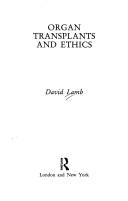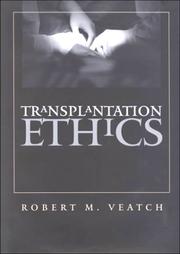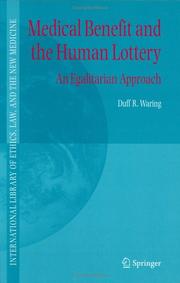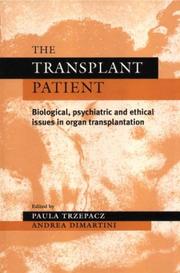| Listing 1 - 10 of 11 | << page >> |
Sort by
|
Book
ISBN: 9780813218748 0813218748 Year: 2011 Publisher: Washington, D.C.: Catholic university of America press,
Abstract | Keywords | Export | Availability | Bookmark
 Loading...
Loading...Choose an application
- Reference Manager
- EndNote
- RefWorks (Direct export to RefWorks)

ISBN: 0415037166 Year: 1990 Publisher: London New York Routledge
Abstract | Keywords | Export | Availability | Bookmark
 Loading...
Loading...Choose an application
- Reference Manager
- EndNote
- RefWorks (Direct export to RefWorks)

ISBN: 0878408118 0878408126 9780878408115 9780878408122 Year: 2000 Publisher: Washington, D.C.: Georgetown university press,
Abstract | Keywords | Export | Availability | Bookmark
 Loading...
Loading...Choose an application
- Reference Manager
- EndNote
- RefWorks (Direct export to RefWorks)
Three decades after the first heart transplant surgery stunned the world, organs including eyes, lungs, livers, kidneys, and hearts are transplanted every day. But despite its routine nature -- or perhaps because of it -- transplantation offers enormous ethical challenges. A medical ethicist who has been involved in the organ transplant debate for many years, Robert M. Veatch offers the first complete and systematic account of the ethical and policy controversies surrounding organ transplants.Veatch structures his discussion around three major topics: the definition of death, the procurement of organs, and the allocation of organs. He addresses both fundamental questions and recently emerging issues, offering his own solutions in many instances.Rich with case studies and written in an accessible style, this comprehensive reference is intended for a broad cross section of people interested in the ethics of transplantation from either the medical or public policy perspective: patients and their relatives, transplantation professionals, other health care professionals and administrators, members of organ procurement organizations, and government officials involved in the regulation of transplants. Transplantation of organs offers difficult ethical challenges to the medical profession. In this study, debate is structured around three major topics: the definition of death and the procurement and allocation of organs. It offers both commentary and solutions for recent issues.
Book
ISSN: 16285255 ISBN: 9782021393590 2021393593 Year: 2018 Publisher: Paris: Seuil,
Abstract | Keywords | Export | Availability | Bookmark
 Loading...
Loading...Choose an application
- Reference Manager
- EndNote
- RefWorks (Direct export to RefWorks)
"Au cours de ses réflexions sur la transplantation, dans sa dimension à la fois technique et sociale, Sylviane Agacinski souligne l'ambiguïté d'une pratique médicale qui sauve de nombreuses vies mais crée aussi une "demande d'organes" : comment y répondre ? D'abord, soutient l'auteur, en protégeant le corps des vivants face aux ultralibéraux, partisans d'un marché légal des organes, et aux trafiquants dont les miséreux et les réfugiés sont victimes, lorsque les États laissent faire. Ensuite, en privilégiant le don de soi post mortem, librement consenti, plutôt qu'en maintenant le stratagème du "consentement présumé du défunt". Sylviane Agacinski s'appuie ici sur Marcel Mauss pour en appeler à une société solidaire, dans laquelle chacun peut à son tour recevoir ou donner et, quelquefois, transmettre la vie par-delà la mort."
Book
ISBN: 0896032000 1461267854 1461204895 9780896032002 Year: 1991 Volume: vol *9 Publisher: Clifton (N.J.): Humana press,
Abstract | Keywords | Export | Availability | Bookmark
 Loading...
Loading...Choose an application
- Reference Manager
- EndNote
- RefWorks (Direct export to RefWorks)
Transplantation of organs, tissues, etc --- Homografts --- Moral and ethical aspects --- Transplantation of organs, tissues, etc. --- Transplantation of organs, tissues, etc. - Moral and ethicalaspects. --- Homografts - Moral and ethical aspects. --- Transplantation of organs, tissues, etc. - Moral and ethical aspects --- Homografts - Moral and ethical aspects
Book
ISBN: 9783725560608 3725560609 Year: 2010 Publisher: Genève: Schulthess,
Abstract | Keywords | Export | Availability | Bookmark
 Loading...
Loading...Choose an application
- Reference Manager
- EndNote
- RefWorks (Direct export to RefWorks)
Transplantation of organs, tissues, etc --- Donation of organs, tissues, etc --- Law and legislation --- Moral and ethical aspects --- E-books --- Transplantation of organs, tissues, etc - Law and legislation - Switzerland --- Transplantation of organs, tissues, etc - Moral and ethical aspects - Switzerland --- Donation of organs, tissues, etc - Law and legislation - Switzerland --- Donation of organs, tissues, etc - Moral and ethical aspects - Switzerland --- Bioéthique --- Transplantation (chirurgie) --- Suisse
Book
ISBN: 2908986191 9782908986198 Year: 1994 Publisher: Suresnes: Éd. de l'Ancre,
Abstract | Keywords | Export | Availability | Bookmark
 Loading...
Loading...Choose an application
- Reference Manager
- EndNote
- RefWorks (Direct export to RefWorks)
Transplantation of organs, tissues, etc. --- Christian ethics. --- Moral and ethical aspects. --- 241.63*5 --- Christian ethics --- Transplantation of organs, tissues, etc --- -#GROL:SEMI-241.63*2 --- Medical transplantation --- Organ transplantation --- Organ transplants --- Organs (Anatomy) --- Surgical transplantation --- Tissue transplantation --- Tissues --- Transplants, Organ --- Surgery --- Preservation of organs, tissues, etc. --- Procurement of organs, tissues, etc. --- Ethical theology --- Moral theology --- Theology, Ethical --- Theology, Moral --- Christian life --- Christian philosophy --- Religious ethics --- Theologische ethiek: bio-ethiek (bioethiek); genetische experimenten; transplantatie; eugenetica --- Moral and ethical aspects --- Transplantation --- 241.63*5 Theologische ethiek: bio-ethiek (bioethiek); genetische experimenten; transplantatie; eugenetica --- #GROL:SEMI-241.63*2 --- Moral and religious aspects --- Transplantation of organs, tissues, etc. - Moral and ethical aspects

ISBN: 1402029705 140202973X 9781402029707 9781402029738 Year: 2004 Volume: 22 Publisher: Dordrecht: Springer,
Abstract | Keywords | Export | Availability | Bookmark
 Loading...
Loading...Choose an application
- Reference Manager
- EndNote
- RefWorks (Direct export to RefWorks)
Bioethicists, moral philosophers and social policy analysts have long debated about how we should decide who shall be saved with scarce, lifesaving resources when not all can be saved. It is often claimed that it is fairer to save younger persons and that age is an ethically relevant consideration in such tragic decisions. Medical benefit should be maximized and final selection should aim to minimize the contaminating influence of chance. These claims are challenged by Duff R. Waring in Medical Benefit and the Human Lottery, one of the few books that attempts a sustained defence of random patient selection. This book combines ethics and political philosophy in its novel and strict egalitarian approach to patient selection for transplantable organs. Waring addresses the question of whether we should choose between lives on the basis of fair chances or best outcomes. He argues that final selection criteria should be based on fair chances that equalize opportunity as opposed to best outcomes. His defence of "hardy" egalitarianism aims to show that random selection by lottery can affirm both a common humanity and the equal value of lives. In so doing, Waring argues that we give the principle of equal concern and respect a radical expression: above a noncomparative threshold of medical benefit, each candidate can have an equal claim to life. The notion of patient selection by lottery has not fared well in bioethics and has been regarded by some as a moral affront. Waring argues that a human selection lottery may be neither as crude nor as ethically anomalous as some have supposed. Indeed, it can reflect a familiar conception of equality as a political and moral ideal. This conception abstracts from many undeniable differences between patients and claims that scarce resources should be allocated on the principled assumption that each of their lives is equally worth saving. The book is also notable for its critiques of some recent utilitarian notions of medical benefit which can have an age-biased impact on elderly patients. Waring then argues against the leading, contemporary age-based approaches to patient selection.He explores the way random selection by lottery can affirm his egalitarian ethos in cases where eligible transplant candidates have each passed a threshold level of prospective medical benefit that has been set by democratic deliberation. Taming chance with a human lottery is defended as the most lucid means of ensuring equal opportunity.
Health Care Rationing --- Patient Selection --- Age Factors --- Organ Transplantation --- Medical ethics --- Transplantation of organs, tissues, etc. --- ethics --- Moral and ethical aspects --- Transplantation of organs, tissues, etc --- Biomedical ethics --- Clinical ethics --- Ethics, Medical --- Health care ethics --- Medical care --- Medicine --- Moral and religious aspects --- Bioethics --- Professional ethics --- Nursing ethics --- Social medicine --- Philosophy. --- Ethics. --- Medicine—Philosophy. --- Political philosophy. --- Philosophy, general. --- Philosophy of Medicine. --- Political Philosophy. --- Political philosophy --- Deontology --- Ethics, Primitive --- Ethology --- Moral philosophy --- Morality --- Morals --- Philosophy, Moral --- Science, Moral --- Philosophy --- Values --- Mental philosophy --- Humanities --- Medical ethics. --- Moral and ethical aspects. --- Health Care Rationing - ethics --- Patient Selection - ethics --- Organ Transplantation - ethics --- Transplantation of organs, tissues, etc. - Moral and ethical aspects

ISBN: 1107112826 0521283337 0511116314 0511328710 0511544383 1280151951 0511155239 9786610151950 0511053290 0511020635 9780511020636 9780511116315 9780511544385 6610151954 9780511053290 9780521553544 0521553547 9781280151958 0521553547 9781107112827 9780521283335 9780511328718 9780511155239 Year: 2000 Publisher: Cambridge: New York: Cambridge university press,
Abstract | Keywords | Export | Availability | Bookmark
 Loading...
Loading...Choose an application
- Reference Manager
- EndNote
- RefWorks (Direct export to RefWorks)
Organ transplantation is an essential element of treatment for a wide range of diseases, but despite increasing surgical success rates there remain many other issues affecting selection of patients and clinical outcome with which clinicians and patients themselves must be familiar. Originally published in 2000, this book reviews psychosocial, psychiatric and ethical aspects of organ transplantation in a uniquely authoritative way. Drawing heavily on the pioneering work of the Pittsburgh transplant team, it surveys the essentials of transplantation biology before engaging with a range of topics fundamental to the success of the procedure and the quality of life of recipients and donors alike. The interdisciplinary approach and the authority of the contributors will make this book of value to anyone with an interest in organ transplantation procedures.
Transplantation of organs, tissues, etc. --- Medical transplantation --- Organ transplantation --- Organ transplants --- Organs (Anatomy) --- Surgical transplantation --- Tissue transplantation --- Tissues --- Transplant surgery --- Transplantation surgery --- Transplants, Organ --- Surgery --- Preservation of organs, tissues, etc. --- Procurement of organs, tissues, etc. --- Physiological aspects. --- Psychological aspects. --- Moral and ethical aspects. --- Moral and religious aspects --- Transplantation --- Transplantation of organs, tissues, etc --- Moral and ethical aspects --- Physiological aspects --- Psychological aspects --- Ethics, Medical. --- Organ Transplantation --- physiology. --- psychology. --- Ethics, Medical --- psychology --- physiology --- Transplantation of organs, tissues, etc. - Physiological aspects --- Transplantation of organs, tissues, etc. - Psychological aspects --- Transplantation of organs, tissues, etc. - Moral and ethical aspects --- Organ transplantation - psychology --- Organ Transplantation - physiology
Book
ISSN: 12425087 ISBN: 2130505791 9782130505792 Year: 2000 Publisher: Paris: PUF,
Abstract | Keywords | Export | Availability | Bookmark
 Loading...
Loading...Choose an application
- Reference Manager
- EndNote
- RefWorks (Direct export to RefWorks)
En 2008, en France, 222 patients sont décédés faute d'avoir reçu un greffon à temps, alors que seulement 4 620 greffes avaient été réalisées pour 13 687 personnes en attente. La pénurie est particulièrement aiguë pour les malades qui ont besoin d'un rein : on compte en moyenne seulement 1 greffon disponible pour 3 malades. Cette situation est assez générale en Europe, mais moins grave dans certains pays qui ont su développer, de différentes manières, une plus grande mobilisation des deux sources de greffons : les donneurs décédés et les donneurs vivants. Le séminaire qui s'est tenu à Paris les 6 et 7 mai 2009 s'est proposé de contribuer à la réflexion des autorités en charge de la révision des lois de bioéthique ainsi que, plus généralement, des milieux médicaux et de l'opinion publique, en apportant un éclairage européen sur les solutions possibles au déficit constaté. Des personnalités faisant autorité - médecins et chirurgiens, mais aussi juristes, sociologues, philosophes et responsables administratifs venant d'Allemagne, d'Espagne, d'Italie, de Grande-Bretagne, de Norvège, des Pays-Bas et de Suède - ont été invitées à présenter leurs expériences et à débattre des aspects éthiques associés, en présence de leurs homologues français et de responsables politiques. Cet ouvrage transcrit les interventions et les débats, souvent vifs, qui les ont suivies. Penser la greffe aujourd'hui, c'est l'envisager à travers les enjeux de la société. Face aux certitudes médicales, chaque individu perçoit des incertitudes éthiques. Les défis de la science imposent la transparence, garantie d'une " nouvelle démocratie ". La greffe apparaît alors ambivalente, dans son fondement philosophique, juridique et social, comme dans sa pratique chirurgicale. Faut-il parler de don altruiste ou d'échange réciproque à propos des " éléments et produits du corps humain " ? Dans le cas d'un prélèvement sur une personne décédée, la mort devient-elle " utile " parce qu'utilisée ? S'agit-il de mutiler pour réparer, ou de reconstruire l'homme et de repousser ainsi les limites de la vie ? Sur le terrain, le nombre important des refus de prélèvements induit-il vraiment une " pénurie " d'organes ? Faut-il l'attribuer au manque d'information du public, à la méfiance à l'égard des médecins, à l'attachement à des valeurs personnelles, aux droits des familles, à l'incontournable présence de l'Etat ? Le législateur, depuis l'élaboration des lois de bioéthique jusqu'à leur application réglementaire encore inachevée, a tenté de réaliser un cadre protecteur pour la personne humaine. Y est-il parvenu ? Ces débats d'idées ainsi que les résultats inattendus de la première enquête nationale sur le don d'organes constituent le point le plus complet à ce jour sur le sujet du prélèvement et de la greffe. Ce livre est né de la volonté d'éclairer les citoyens et d'attirer l'attention des politiques sur ce constat : la greffe existe, elle se doit de rester humaine.
Transplantation of organs, tissues, etc. --- Medical ethics --- Greffe (Chirurgie) --- Ethique médicale --- Moral and ethical aspects --- Aspect moral --- Donation of organs, tissues, etc --- Transplantation of organs, tissues, etc --- Immunospecificity --- Donation of organs, tissues, etc. --- Immunospecificity. --- Transplantation --- Government Regulation --- Social Conditions --- orgaantransplantatie (allocatie van organen, donorschaarste) --- Frankrijk --- Immunological specifics --- Serological specificity --- Specificity (Immunology) --- Antibody diversity --- Antigenic determinants --- Binding sites (Biochemistry) --- Immune recognition --- Medical transplantation --- Organ transplantation --- Organ transplants --- Organs (Anatomy) --- Surgical transplantation --- Tissue transplantation --- Tissues --- Transplants, Organ --- Surgery --- Preservation of organs, tissues, etc. --- Procurement of organs, tissues, etc. --- Government Regulation and Oversight --- Government Regulations --- Regulation, Government --- Regulations, Government --- Transplantations --- Transplantation Immunology --- Transplantation Conditioning --- Anatomical gifts --- Organ donation --- Tissue donation --- ethics --- history --- transplantation d'organes (greffe d'organes, pénurie d'organes, allocation d'organes) --- France --- Donation --- Human transplant --- Socio-ethics --- Ethique médicale --- Transplant surgery --- Transplantation surgery --- Living Conditions --- Condition, Living --- Condition, Social --- Conditions, Living --- Conditions, Social --- Living Condition --- Social Condition --- Donation of organs, tissues, etc - Moral and ethical aspects - France --- Transplantation of organs, tissues, etc - Moral and ethical aspects - France
| Listing 1 - 10 of 11 | << page >> |
Sort by
|

 Search
Search Feedback
Feedback About UniCat
About UniCat  Help
Help News
News